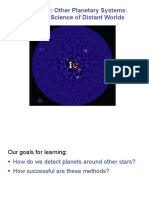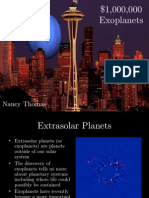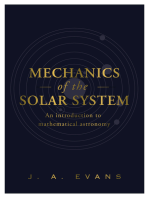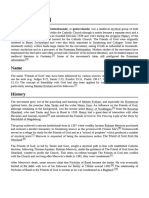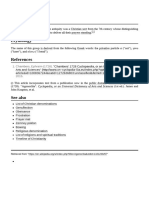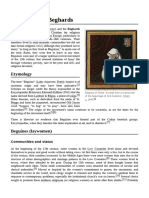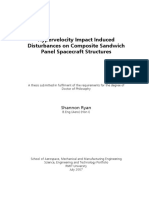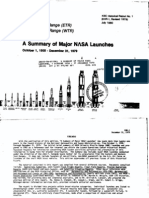0 ratings0% found this document useful (0 votes)
48 viewsKepler 283c
Kepler-283c is an exoplanet orbiting the star Kepler-283 every 93 days. It has a radius of 1.82 Earth radii and an estimated surface temperature of -34.6°C. Kepler-283c is located about 1,596 light years from Earth in the constellation of Cygnus.
Uploaded by
norma6742Copyright
© © All Rights Reserved
Available Formats
Download as PDF, TXT or read online on Scribd
0 ratings0% found this document useful (0 votes)
48 viewsKepler 283c
Kepler-283c is an exoplanet orbiting the star Kepler-283 every 93 days. It has a radius of 1.82 Earth radii and an estimated surface temperature of -34.6°C. Kepler-283c is located about 1,596 light years from Earth in the constellation of Cygnus.
Uploaded by
norma6742Copyright
© © All Rights Reserved
Available Formats
Download as PDF, TXT or read online on Scribd
You are on page 1/ 2
Kepler-283c
Kepler-283c is an exoplanet orbiting the K-type star Kepler-
283 every 93 days in the circumstellar habitable zone,
Kepler-283c
discovered by the Kepler space telescope in 2014.[4] Discovery
Discovery site Kepler Space
Characteristics Observatory
Discovery date 2014
Detection Transit
Mass, radius and temperature method
It has a surface equilibrium temperature of 238.5 K (−34.6 °C; Orbital characteristics
−30.4 °F).[3] Its radius is 1.82 R🜨. Its orbit is circular with an Semi-major 0.336144±2.93e-
eccentricity of 0. axis 06[1] AU
Eccentricity 0
Host star Orbital period 92.750106±0.001214
(sidereal) d
The planet orbits a late orange dwarf star called Kepler-283, Inclination 88.43±0.846
spectral type K7V, about 1,596 light years from Earth in the
Star Kepler-283
constellation of Cygnus.[5]
Physical characteristics
Mean radius 1.82 R🜨
Orbit
Synodic ≙9.11 hr[2]
The planet orbits its star every 93 days, at a distance of around rotation period
0.336 AU Temperature 238.5 K (−34.6 °C;
−30.4 °F) [3]
References
1. "HEC: Exoplanets Calculator - Planetary Habitability Laboratory @ UPR Arecibo" (https://we
b.archive.org/web/20170824164045/http://phl.upr.edu/projects/habitable-exoplanets-catalog/
calculators). phl.upr.edu. Archived from the original (https://phl.upr.edu/projects/habitable-ex
oplanets-catalog/calculators) on 2017-08-24. Retrieved 2015-08-27.
2. Hall, C.; Stancil, P. C.; Terry, J. P.; Ellison, C. K. (2023). "A New Definition of Exoplanet
Habitability: Introducing the Photosynthetic Habitable Zone" (https://doi.org/10.3847%2F204
1-8213%2Facccfb). The Astrophysical Journal Letters. 948 (2): L26. arXiv:2301.13836 (http
s://arxiv.org/abs/2301.13836). Bibcode:2023ApJ...948L..26H (https://ui.adsabs.harvard.edu/a
bs/2023ApJ...948L..26H). doi:10.3847/2041-8213/acccfb (https://doi.org/10.3847%2F2041-8
213%2Facccfb).Table 2 (https://arxiv.org/pdf/2301.13836.pdf#page=9)
3. "K01298.02" (https://exoplanetarchive.ipac.caltech.edu/cgi-bin/DisplayOverview/nph-Displa
yOverview?objname=K01298.02&type=KEPLER_CANDIDATE).
exoplanetarchive.ipac.caltech.edu.
4. "Kepler-283 c" (https://exoplanetarchive.ipac.caltech.edu/cgi-bin/DisplayOverview/nph-Displ
ayOverview?objname=Kepler-283+c&type=CONFIRMED_PLANET).
exoplanetarchive.ipac.caltech.edu.
5. "SIMBAD Query Result: Kepler-283 -- Rotating Variable" (http://simbad.u-strasbg.fr/simbad/s
im-id?protocol=html&Ident=KOI-1298). SIMBAD. Centre de Données astronomiques de
Strasbourg. Retrieved 1 February 2023.
Retrieved from "https://en.wikipedia.org/w/index.php?title=Kepler-283c&oldid=1177269937"
You might also like
- Transit Method To Detect Exoplanets: Randeer Pratap Gautam (No ratings yetTransit Method To Detect Exoplanets: Randeer Pratap Gautam (16 pages
- List of Exoplanets Discovered by The Kepler Space Telescope 1001-1500No ratings yetList of Exoplanets Discovered by The Kepler Space Telescope 1001-150023 pages
- Chapter 10: Other Planetary Systems: The New Science of Distant WorldsNo ratings yetChapter 10: Other Planetary Systems: The New Science of Distant Worlds41 pages
- Letter: A Rocky Composition For An Earth-Sized ExoplanetNo ratings yetLetter: A Rocky Composition For An Earth-Sized Exoplanet9 pages
- Planet Hunters X. KIC 8462852 - Where's The Flux?No ratings yetPlanet Hunters X. KIC 8462852 - Where's The Flux?15 pages
- Astronomy Investigatory Project Class 12 Prince BaraiyaNo ratings yetAstronomy Investigatory Project Class 12 Prince Baraiya6 pages
- KEPLER: New Planet Discovered and Evidences: BackgroundNo ratings yetKEPLER: New Planet Discovered and Evidences: Background6 pages
- Characteristics: HD 219134 B (Or HR 8832 B) Is One of at Least Five ExoplanetsNo ratings yetCharacteristics: HD 219134 B (Or HR 8832 B) Is One of at Least Five Exoplanets3 pages
- "Speed of Dark": Dark Is The Absence of Light, or Light Is The Absence of Dark... ?No ratings yet"Speed of Dark": Dark Is The Absence of Light, or Light Is The Absence of Dark... ?1 page
- NASA's Kepler Discovers First Earth-Size Planet in The 'Habitable Zone' of Another StarNo ratings yetNASA's Kepler Discovers First Earth-Size Planet in The 'Habitable Zone' of Another Star3 pages
- 3rd SAO (2015) Compiled Answers (Public Release)No ratings yet3rd SAO (2015) Compiled Answers (Public Release)27 pages
- 5.6 - Kepler's Laws - Physics LibreTextsNo ratings yet5.6 - Kepler's Laws - Physics LibreTexts13 pages
- This Presentaion Has Been Rated Teachers' Guidance Strongly AdvisedNo ratings yetThis Presentaion Has Been Rated Teachers' Guidance Strongly Advised22 pages
- Mechanics of the Solar System: An Introduction to Mathematical AstronomyFrom EverandMechanics of the Solar System: An Introduction to Mathematical Astronomy5/5 (1)
- List of Religions and Spiritual TraditionsNo ratings yetList of Religions and Spiritual Traditions51 pages
- List of The Largest Protestant DenominationsNo ratings yetList of The Largest Protestant Denominations9 pages
- KP Astrology Basics What Are Sign Lords, Star Lords and Sub Lords in KP AstrologyNo ratings yetKP Astrology Basics What Are Sign Lords, Star Lords and Sub Lords in KP Astrology4 pages
- Satellite Communication Lecture Notes - Electronics and Communications Lecture NotesNo ratings yetSatellite Communication Lecture Notes - Electronics and Communications Lecture Notes8 pages
- Space Frontier Foundation - SFC 11 Report and PhotosNo ratings yetSpace Frontier Foundation - SFC 11 Report and Photos4 pages
- Understand Your Life Partner Through Horoscope - Sruthi AstrologyNo ratings yetUnderstand Your Life Partner Through Horoscope - Sruthi Astrology2 pages
- Mohabbat Esa Naghma Hai by Kanwal Riaz Urdu Novels Center67% (3)Mohabbat Esa Naghma Hai by Kanwal Riaz Urdu Novels Center24 pages
- 1:48 Scale: SPACE-X "Crew Dragon 2" Capsule Demo Mission-1 ConfigurationNo ratings yet1:48 Scale: SPACE-X "Crew Dragon 2" Capsule Demo Mission-1 Configuration6 pages
- Kids Box American English Level6 Students Book Table of ContentsNo ratings yetKids Box American English Level6 Students Book Table of Contents2 pages
- Propoganda During The Space Race - IB History IA Paper0% (1)Propoganda During The Space Race - IB History IA Paper13 pages
- A Summary of Major NASA Launches, 1 October 1958 - 31 December 1979100% (2)A Summary of Major NASA Launches, 1 October 1958 - 31 December 1979198 pages













